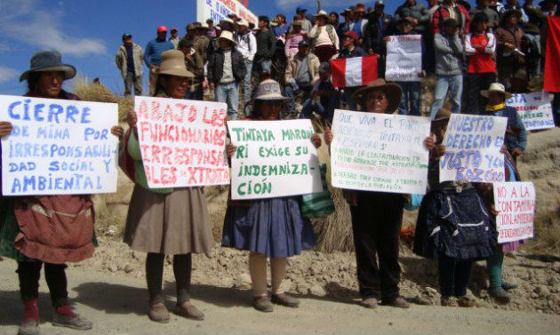

Speakers:

Melcuro Surco Rimachi:
President ADEPAMI (Association for the Defense of Paccpaco Affected by Mining); Melchora is native to the community of Yauri in Espinar and is one of the direct victims of the pollution. Her body contains levels of heavy metals above the maximum legal permitted levels.

Fernando Osores Plenge: Medical doctor and specialist in environmental health. Fernando is a professor and formerly worked in the Health Ministry’s National Center for Occupational Health and Protection of the Environment for Health.

Juan Carlos Ruiz Molleda: Lawyer with the Institute for Legal Defense (IDL). Juan Carlos specializes in constitutional law and coordinates IDL’s unit on indigenous rights. Previously he worked with Peru’s Truth and Reconciliation Commission.

Ana María Vidal Carrasco:
Vice Executive Secretary with the Peru National Coordinator for Human Rights. Ana María is a human rights lawyer who previously worked with the Women’s Ministry and Peru’s Truth and Reconciliation Commission.
When:
April 7, 2016
12:30-2:00pm
Where:
Amazon Watch/CIEL Conference Room
1350 Connecticut Ave. NW #1100
Peru is emblematic of the challenges facing indigenous peoples across the Andean Amazon. Oil drilling and mega-mining projects, amongst other state-sanctioned and illicit extractive industries, have violated indigenous sovereignty and often imply serious environmental and health problems within indigenous territories.
The program will feature the perspectives of grassroots, health, and legal experts from Peru who are presenting these issues before the Inter-American Commission of Human Rights. They will outline several current case studies: The epidemic of Amazon oil spills along the Northern Peruvian Pipeline and the health crisis around mining projects in Espinar (Cusco), resulting in dangerous levels of heavy metals in the bodies of local residents.
Representatives of Oxfam America and Amazon Watch will offer context.